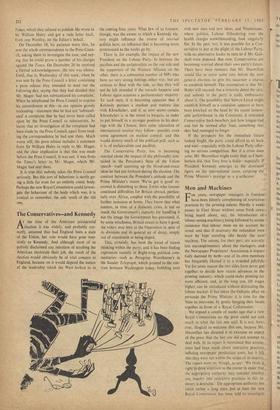The Conservatives—and Kennedy
Athe time of the American presidential election it was widely, and probably cor- rectly, assumed that had England been a state of the Union, her vote would have gone mas- sively to Kennedy. And although most of us politely disclaimed any intention of teaching the American electorate their job, the result of the election would obviously be of vital concern to England, because on it would depend the nature of the leadership which the West looked to in the coming four years. What few of us foresaw, though, was the extent to which a Kennedy vic- tory might influence the course of internal politics here; an influence that is becoming more pronounced as the weeks go by.
There is, for example, the impact of the new President on the Labour Party. In between the pacifists and the unilateralists on the one side and the supporters of the Western Alliance on the other, there is a substantial number of M Ps who have no very strong feelings either way. but are anxious to float with the tide, so that they will not be left stranded if the miracle happens and Labour again acquires a parliamentary majority. To such men, it is becoming apparent that if Kennedy pursues a resolute and realistic line with Khrushchev, and if, as now seems certain, Khrushchev is in the mood to bargain, in order to put himself in a stronger position in his deal- ings with the Chinese, then some relaxation of international tension may follow—possibly even some agreement on nuclear control; and this would destroy much of the political pull, such as it is, of unilateralism and pacifism.
The Conservative Party, too, is becoming worried about the impact of the philosophy con- tained in the President's State of the Union speech--itself summing up the blood-and-sweat ideas he had put forward during the election. The contrast between the President's attitude.and the Prime Minister's recent 'We've got it good' re- avowal is disturbing to those Tories who foresee continued difficulties for Britain abroad, particu- larly over Africa, coupled with the possibility of further recession at home. They know that what matters, in time of a domestic crisis, is not so much the Government's capacity for handling it but the image the Government has presented; if, by sonic mischance, Britain ceases to have it good, the voters may turn to the Opposition in spite of its divisions and its general air of decay, simply out of resentment at being duped.
This, certainly, has been the trend of recent thinking within the party, and it has been finding expression recently in Right-wing political com- mentaries—such as Peregrine Worsthorne's in the Sunday Telegraph, which pointed to the con- trast between .Washington today, bubbling over with new men and new ideas, and Westminster, where politics, Labour filibustering over the health charges notwithstanding, look singularly flat. In the past, too, it was possible for a Con- servative to jeer at the plight of the Labour Party, with no alternative leader to turn to if Mr. Gait- skell were deposed. But now, Conservatives arc becoming worried about their own party's future. [here have been rumours that Mr. Macmillan would like to' retire some time before the next general election, to give his successor a chance to establish himself. The assumption is that NI r.' Butler will succeed: but a minority detest the idea. and nobody in the party is really enthusiastic about it The possibility that Selwyn Lloyd might establish himself as a candidate appears to have been knocked on the head by his recent lament- able performance in the Commons; it reminded. Conservative back-benchers just how tongue-tied, and lost he seemed after Suez, something that they had managed to forget.
If the prospects for the immediate future looked bright, the party could afford to sit back and wait espeCially with the Labour Party offer- ing no serious competition. But if a crisis does arise, Mr. Macmillan might easily find, as Cham- berlain did, that Tory love is fickle—especially if' President Kennedy emerges as the dominant"' figure on the international scene, eclipsing the Prime Minister's prestige as a pacificator.


































 Previous page
Previous page